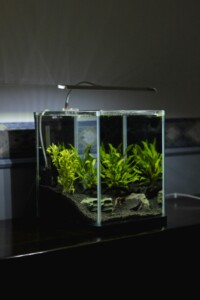
In feng shui practice, common remedies to balance rooms include use of the five natural elements. The five natural elements are water, wood, fire, earth and metal. Water is the “shui” of feng shui, which literally translates as wind/water. The recommendation and application to use water should be specific and unique to the property being evaluated. There ARE bad locations for water, so it should be understood that water is not a general panacea for all feng shui flaws.
First, let’s define water a little more thoroughly. Water is literally H2O. While pictures of water and lakes might serve some other relaxing or subliminal purpose, in traditional feng shui, when water is called for, the real thing is needed. Water should be clean and I’ve noticed it is about twice as effective when it is gently circulating. The sound of water can be relaxing and care should be taken to make sure the water does not move too quickly or make an unpleasant sound.
Volume of water is also important. Many people use too little and only get a little result. Gallons of water may be needed to make a big impact on a room and thousands of gallons might be needed to impact a whole building. The use of blue or black color on a large scale, like a whole wall, can emit some of the water energy, but real water is preferred, as in a fountain or fish tank.
The way to determine the best location for water in and around your properties, long term as well as for annual purposes, is based on calculating when your house was built and what direction it is facing. While this is not rocket science, training is needed in order to understand how this is done. There are a few really good books (including mine) which reach this level of feng shui understanding and one should be wary of sources which try to over-simplify this practice.
For example, some diluted versions of feng shui will maintain that water is welcome at any entrance. Not so. In my own home, the use of water at the entrance could trigger bone or muscle problems, even legal disputes.
Other simplified schools maintain that the direction of North is inherently associated with water, so they advise to place fountains in the north sector of any house. Not so. In fact, in 2018 everyone’s North sector had the annual influence (the 5 star) which is very irritable energy and by introducing a moving water feature, one could unknowingly stir up more negativity in that area and cause someone to have an injury or set-back.
So, where can water go? The absolute best long term location for water on any person’s property has to be dealt with individually, in the same way that a conscientious doctor would not give advice over the internet, without doing a physical exam on the patient. But in terms of ANNUAL influences, water can be used a number of ways to enhance positives or weaken negatives.
For example, the annual 4 star (associated with romance, creativity and travel) was located in the direction of south in 2018 and in North in 2019. This “wood” type energy can be enhanced with water in the same way that a watered plant will thrive. In order to know where any directional sectors are, you need to take an accurate compass reading of the property as a whole and also know how to divide up a to-scale floor plan. Then you know the location and boundaries of these areas.
Another example is the annual 7 star, which was in the east sector in 2018. This visiting energy is associated with deception, injury, stealing or betrayal. As a “metal” type of energy, it is weakened with the presence of water. That said, I do have clients who need to use fire in the east and it has everything to do with the way the annual and permanent energies intersect.
This is just a beginner’s expose on how water, in and of itself, is not good or bad, but WHERE you place it and what it may be doing for you, is the critical point. Like the other elements of wood, fire, earth and metal, none are categorically good or bad elements. There is no such thing as a good or bad element. But the relationship between seen and unseen influences and even how their interpretation changes over time, all have to be factored in.
There are also good locations for water outside a building. Some need water in front and others behind, even though old feng shui texts sometimes just refer to the ideal setting as having a mountain in back and a stream running gently in front of a property. There are four major house types and the mountain in back/water in front principle only applies to one of those four house types.
Water is the universal solvent and amazing in its own way, above and beyond its use in feng shui. Studies have shown that water molecules can retain memory and respond to subjective human influences. Human beings are a large percentage of water and this is just one reason why we respond to the cycles of the moon which influence our oceans too. Water can be nurturing, reductive or destructive, as we all see examples of in nature.
Author: Kartar Diamond
Company: Feng Shui Solutions ®
From the Feng Shui Theory Blog Series
